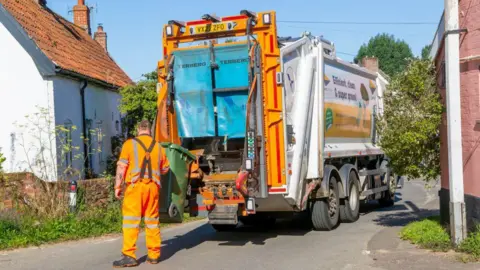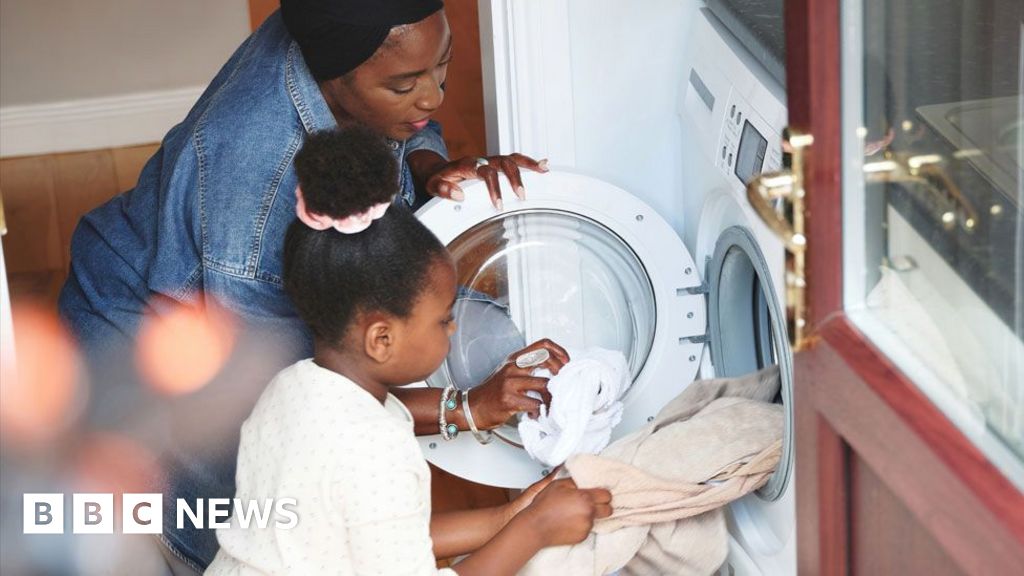
 Getty Images
Getty Images
A range of household bills, including council tax, water, gas and electricity have risen today.
The BBC's cost of living correspondent, Kevin Peachey, has been answering your most asked questions on the price rises.
Why are bills going up?
Tashi and Chris asked why bills are going up.
This is a very simple question, but I'm afraid the answer isn't straightforward. There are a host of reasons why bills are rising.
On energy, it's the consequence of an increase in wholesale prices paid by suppliers, often owing to global events.
Councils and water companies, meanwhile, say there's a desperate need to raise bills to pay for investment in services.
Some bill increases are always scheduled for this time of year, to match the rate of rising prices - inflation.
So another question is: what can you do about it?
Consumer groups are urging people to shop around, claim everything they are entitled to, and cut back where possible.
Is cash a better way to budget?
James: I get £150 in cash out every week. It's amazing how it helps you budget things. Why don't more people try it?
There is evidence of people turning to notes and coins to help them budget.
Although cash use was hit during the pandemic, it has made a bit of a comeback, with many people taking the same view as James.
However, there are areas in which this doesn't work.
Shopping around for a better deal on essential bills is often something done online, and may require signing up to a direct debit payment. Rewards, or money off, are often also available to those who pay by card.
So, it may well be that using a mix of ways to pay works best - but questions remain about access to cash and internet services among the vulnerable.

 Getty Images
Getty Images
Will my wage rise be eaten away by tax?
Richard Kendall asked about frozen tax thresholds, which mean pay rises can see people drawn into paying higher rates of income tax.
This is what is known as fiscal drag - not a phrase you'll hear talked about much, but it is important.
It means that while income tax rates haven't risen, the income levels at which they are paid have been frozen, and will continue to be so until 2028.
There have been rumours that the freeze could be extended, but there are no concrete plans for that as yet.
So, more people are being dragged into paying higher rates of tax, or simply having a greater proportion of their income taxed.
Taking a closer look at your pay slip is worthwhile, and it needs to be considered when looking at your personal budget. Experts say studying exactly how much post-tax income is coming in, and looking at it alongside your spending, is never a waste of time.
And it may require you to trim some of your spending. Shopping around, or cancelling unused subscriptions are a good start, experts say.
Do we just have to accept water bill increases?
Colin Smith: Do we simply have to accept water bill increases because we can't shop around?
Water services are different, because the 'switch for a better deal' advice simply doesn't, ahem, hold water.
There is plenty of debate over why water bills are going up so much (remember some suppliers wanted bigger increases).
But there are things you can do to keep your costs down, even though you can't shop around.
Experts say getting a water meter fitted can reduce bills if you have relatively low usage. Water-saving shower heads, or similar, are available free from some companies.
Then, there is the WaterSure scheme, which means the bill is capped for people on certain benefits, who have a medical condition, or who have a certain number of school-age children at home. You do need to apply for this help though.
Martin Lewis on the surprising ways to cut your water bills
Does this hit the government's plans for growth?
Sam Halkyard, 32, from Rotherham: How does the government expect the economy to grow with all these bill increases?
Ministers are pushing their "agenda for growth" at every opportunity, calling for red tape to be cut to pave the way for investment.
There is a delicate balancing act here. The government wants people's living standards to rise, and it wants them to spend to encourage investment by businesses.
Remember, all of this comes with a background of wage rises outpacing prices, an uptick in the housing market, and some signs of hope for the wider economy.
But ministers won't want to see a return of runaway inflation - the annual rise of prices - because that would inevitably lead to a rise in interest rates, and higher borrowing costs for businesses and individuals.
So, outside of this, you are seeing the government push ahead with some big, long-term investment projects, like road tunnels and runways.
I'm single, where's help for me?
Jules, 57: I'm single. My wages don't go up in April. Where's the help for us?
Charities have raised the alarm specifically about people like you, Jules.
Citizens Advice says that single households, including single parents, tend to spend a greater proportion of their income on household bills.
As a result, there is far less wriggle room financially when bills rise.
One solution is to investigate all the options that are open to you. For example, as I'm sure you already know if it includes you, there is a 25% discount on council tax, for those who live on their own.
But there is, without doubt, a single person premium on the cost of living because there's only one income coming in, so it may be harder to deal with the money going out.

 Getty Images
Getty Images
What's happening with energy standing charge?
David Bosworth and Jeff Rumble asked how the energy standing charge applies to bills.
This is a household cost which many people feel is unfair - not least because there is nothing you can do about it.
Standing charges are the fees charged to all billpayers to cover the cost of being connected to a gas and electricity supply. They are unaffected by the amount of energy that a household uses.
After rising sharply in recent years, the average electricity standing charge actually fell from today - although it rose slightly for gas. More significantly, it varies considerably depending on where you live.
The energy regulator, Ofgem, is considering reform that would allow people a choice of ways to pay - but stresses that these costs will still need to be covered.
Council tax: What do I get for it?
Ian Griffiths, from Flintshire, on council tax: Other than having my bin emptied once a fortnight, I don't actually have anything for the money I pay.
In Wales, local authorities are increasing 2025-2026 council tax bills by between 5% and more than 9%.
Ian may be stretching his point a little - local authorities provide a range of services such as street lighting, parks and care services.
However, at its heart, his question highlights a common debate.
Should these bill increases stay at the bare minimum because people are struggling financially, or are our local services in such desperate need of investment that council tax needs to go up above inflation?

 Getty Images
Getty Images
Are pensioners facing a harder hit?
Lyn Nailer: Will pensioners suffer the most from these bill rises?
One important point to stress here is that different people, in different areas of the country, will be affected in different ways.
Water and energy bills vary depending on where you live, and the different nations of the UK have different rules on council tax and more.
But the state pension is UK-wide, and the good news is that it will be going up by more than the rate of price rises from next week. The triple lock means it will increase by 4.1%.
Does everyone get the full state pension? No.
Does the increase mean pensioners' finances won't be stretched? Of course not.
But when asked about how people will cope, ministers are inevitably pointing to this increase as evidence of how the government is helping out.
What about the minimum wage increase?
David and Steve pointed out that incomes are rising, including via an increase of the minimum wage.
Yes, it is not all doom and gloom today.
There is an increase in the minimum wage - up to £12.21 an hour for over 21s - and there are increases too for younger workers and apprentices.
Official figures show that average wages have been rising faster than prices. The state pension and benefits will also go up from next week.
This will certainly help pay some of those bills, and you won't see the impact directly until you look at your bank balance in the coming weeks.
The Treasury is also pointing to moves to freeze fuel duty and ensure the main rates of tax - income tax, VAT and employees' National Insurance - do not go up during this Parliament, as evidence of the support billpayers are receiving.
Is there a silver lining?
Bills may be rising - but for some people, incomes are going up too.
Benefits and the state pension are going up in a week's time. Wages have also been rising at a faster pace than the rate of inflation, and the start of April also brings an increase in the minimum wage. It means:
The minimum wage for over 21s, known officially as the National Living Wage, has risen by 6.7%, from £11.44 to £12.21 an hour. For someone working full time that equates to £23,873.60 a year, up from £22,368.06For 18 to 20-year-olds, the minimum wage has gone up from £8.60 to £10 an hour. This means a full-time worker would earn £19,552 a year, up from £16,815. (Only a minority of people in this age group do work full time)Apprentices are now paid £7.55 an hour, up from £6.40. That means their annual wage is going up to £14,762 from £12,513
 Movie
Movie 2 months ago
74
2 months ago
74 



![Presidents Day Weekend Car Sales [2021 Edition] Presidents Day Weekend Car Sales [2021 Edition]](https://www.findthebestcarprice.com/wp-content/uploads/Presidents-Day-Weekend-car-sales.jpg)



 English (United States)
English (United States)